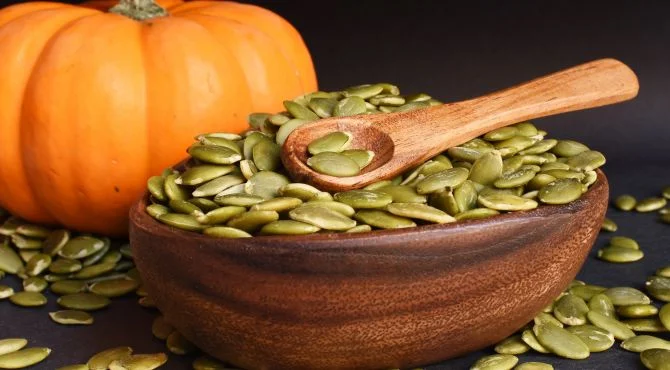11 Science-Based Health Benefits of Pumpkin Seeds

Pumpkin seeds offer a multitude of health benefits grounded in scientific research, encompassing enhanced fertility, improved cardiovascular health, and better blood sugar control.
Pumpkin seeds, despite their diminutive size, are packed with essential nutrients. Even a small quantity can supply a substantial amount of healthy fats, magnesium, and zinc. Consequently, pumpkin seeds have been linked to a variety of health advantages, including cardiovascular health, prostate health, and protection against certain cancers.
Moreover, incorporating these seeds into your diet is a straightforward task. Here are the top 11 scientifically supported health benefits of pumpkin seeds.
Health Benefits of Pumpkin Seeds

- Nutrient-Rich Snacking: Pumpkin seeds, also known as 'pepitas,' are green, flat, and oval seeds that are unlike the hard white seeds found inside carving pumpkins. Just one ounce (28 grams) of shell-free pumpkin seeds contains around 160 calories, primarily from fats and protein. In addition, a 1-ounce serving includes essential nutrients, such as carbohydrates (3g), protein (8.6g), fat (14g), fiber (1.7g), and significant amounts of manganese (56% of the Daily Value), copper (42% of the DV), magnesium (40% of the DV), phosphorus (28% of the DV), zinc (20% of the DV), and iron (14% of the DV). Additionally, pumpkin seeds contain antioxidants and small quantities of potassium, riboflavin, and folate.
- Abundant in Antioxidants: Pumpkin seeds are rich in antioxidants like flavonoids and phenolic acids. They also contain modest levels of vitamin E and carotenoids. Antioxidants help combat inflammation and protect cells from harmful free radicals. This quality makes pumpkin seeds valuable in preventing various diseases. An older study demonstrated that pumpkin seed oil could reduce inflammation in arthritic rats without side effects, outperforming an anti-inflammatory drug.
- Cancer Risk Reduction: Research indicates that pumpkin seeds may contain compounds capable of impeding cancer growth. In a 2012 observational study, consumption of pumpkin seeds was linked to a decreased risk of breast cancer in postmenopausal women. Additional studies propose that the lignans in pumpkin seeds may contribute to preventing and treating breast cancer. Furthermore, a test-tube study revealed that pumpkin seed extract exhibited potential in slowing the growth and spread of prostate cancer cells.
- Support for Prostate and Bladder Health: Pumpkin seeds may alleviate symptoms associated with benign prostatic hyperplasia (BPH), a condition characterized by an enlarged prostate gland that leads to urinary issues. Several studies in humans reported that consuming pumpkin seeds reduced BPH-related symptoms. In a 2021 study, pumpkin seed oil consumption improved the quality of life and reduced symptoms in individuals with BPH, with fewer side effects than a prescription medication. Research also suggests that pumpkin seeds or their derivatives can help address symptoms of an overactive bladder.
- Magnesium-Rich: Pumpkin seeds rank as one of the best natural sources of magnesium, a mineral often lacking in the Western diet. Magnesium plays a crucial role in various bodily processes, including blood pressure regulation, heart disease risk reduction, bone health, and blood sugar control.
- Heart Health Enhancement: Pumpkin seeds are packed with antioxidants, magnesium, zinc, and unsaturated fats, all of which can promote heart health. Human and animal studies have demonstrated that pumpkin seed oil can lower blood pressure and cholesterol levels, reducing the risk factors for heart disease. A 12-week study on postmenopausal women even showed that pumpkin seed oil supplements reduced diastolic blood pressure and increased HDL (good) cholesterol levels.
- Blood Sugar Regulation: Some animal studies have indicated that pumpkin and its derivatives, including seeds and juice, can lower blood sugar levels. A study in healthy adults found that those who consumed meals containing 65 grams of pumpkin seeds experienced reduced blood sugar levels following a high-carb meal. The high magnesium content in pumpkin seeds may contribute to this beneficial effect.
- High Fiber Content: Pumpkin seeds are an excellent source of dietary fiber, providing 1.7 grams in a single 1-ounce serving. High-fiber diets have been linked to improved digestive health and reduced risks of heart disease, type 2 diabetes, and obesity.
- Enhanced Sperm Quality: Pumpkin seeds, rich in zinc, may help improve sperm quality. One animal study found that supplementing with pumpkin seed oil and vitamin E enhanced sperm quality and reproductive performance in roosters. The antioxidants and nutrients in pumpkin seeds can also promote healthy testosterone levels, potentially benefiting fertility in males.
- Sleep Aid: Pumpkin seeds contain tryptophan, an amino acid that can aid sleep. Consuming at least 1 gram of tryptophan daily is believed to improve sleep quality. Additionally, pumpkin seeds are a good source of magnesium, which has been associated with better sleep in some observational studies.
- Easy Dietary Integration: Incorporating pumpkin seeds into your diet is straightforward. They can be consumed as a snack, added to smoothies, yogurt, and fruit bowls, or used in salads, soups, cereals, and baked goods. However, be aware that like many seeds and nuts, pumpkin seeds contain phytic acid, which can reduce nutrient absorption. If consumed regularly, consider soaking or sprouting them to reduce phytic acid content.
Daily Intake and Precautions:

While pumpkin seeds offer numerous health benefits, it's important to consume them in moderation. A daily intake of 1-2 ounces (28-56 grams) is generally considered safe for most individuals. However, it's essential to listen to your body and adjust the amount according to your specific needs.
It's also worth noting that some individuals may have allergies or sensitivities to pumpkin seeds. If you experience any adverse reactions, such as itching, swelling, or difficulty breathing, discontinue consumption and seek medical advice.
Post a Comment